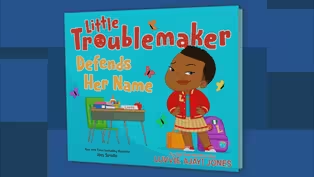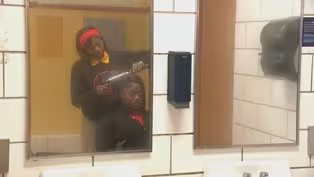Chicago Tonight: Black Voices
Under 'Crime-Free Housing' Laws, People Can Be Evicted for Minor Offenses
Clip: 5/14/2025 | 7m 44sVideo has Closed Captions
A new investigation reveals how in some Illinois cities, a simple 911 call can get renters evicted.
An investigation by The New York Times and the Illinois Answers Project shows that many cities in Illinois have turned crime-free housing programs into a blunt instrument to oust families for virtually any alleged infraction, no matter how minor.
Problems playing video? | Closed Captioning Feedback
Problems playing video? | Closed Captioning Feedback
Chicago Tonight: Black Voices is a local public television program presented by WTTW
Chicago Tonight: Black Voices
Under 'Crime-Free Housing' Laws, People Can Be Evicted for Minor Offenses
Clip: 5/14/2025 | 7m 44sVideo has Closed Captions
An investigation by The New York Times and the Illinois Answers Project shows that many cities in Illinois have turned crime-free housing programs into a blunt instrument to oust families for virtually any alleged infraction, no matter how minor.
Problems playing video? | Closed Captioning Feedback
How to Watch Chicago Tonight: Black Voices
Chicago Tonight: Black Voices is available to stream on pbs.org and the free PBS App, available on iPhone, Apple TV, Android TV, Android smartphones, Amazon Fire TV, Amazon Fire Tablet, Roku, Samsung Smart TV, and Vizio.
Providing Support for PBS.org
Learn Moreabout PBS online sponsorship>> new investigation is revealing how in some Illinois cities a simple 9-1-1, call can get some renters evicted from their homes.
But local ordinances that allow bus known as crime, free housing laws were designed to allow police and landlords to evict violent criminals.
Drug dealers and nuisance tenants from neighborhoods.
But reporting shows some residents were evicted for minor infractions or sometimes for crimes they didn't commit.
Joining us now with more is Sydney kingpin a to a reporter at the Illinois Answers Project Sydney.
Thank you for joining us.
Thank you for having me brand as to what is the origin for these crime free ordinances yet essentially crime free housing laws were intended originally to.
Be a tool for police departments to empower landlords to get out problem tenants, people who are committing violent or felony offenses.
>> They originated in Arizona and made their way to Illinois and the early 2, thousands.
But what we found in our investigation and that is that there are thousands of cases where the original intent and the actual execution of the ordinance.
Is there there's a disparate there.
So to the point of what you found, more than 2000 cases across 25 municipalities in Illinois.
>> Between 2019 2024, what kind of offenses that those cases involved?
Yeah.
And like I mentioned some of those cases where felony offenses, they drug charges they wear violent offenses.
But we found 1300 cases that were for misdemeanor.
Some things as small as calling 9-1-1 for help.
child endangerment or for getting to allowing your child to leave the home.
So small cases like that.
We found over and over and also there are a lot of cases where charges were ultimately dismissed and people are not convicted of the crimes.
They were accused of who are some of the people that you spoke with into one woman I spoke with her name is Kathryn Garcia.
She lives in West Chicago.
She lived in her home for 20 years for into the town home with her 3 She had a son who was experiencing a mental health crisis in the summer of 2023 and had to call 9-1-1, dozens of times for help.
And ultimately the West Chicago Police Department determined that because of her costs and when she was a nuisance and they gave her landlord of choice, under the ordinance or be fined $750 a day the landlord could not afford that find.
So he had no choice.
But to did you find that some municipalities had a more aggressive enforcement mechanism or were more aggressive about enforcing the other municipalities?
Yeah.
>> I think the thing that's interesting about crime for housing in Illinois is that there really isn't any statewide oversight.
So it allows.
>> A lot of subjectivity and the way that the laws are enforced, cities like Orland Park, DeKalb, Belleville, they invest a lot more and their programs.
They have crime, free housing officers who work around the clock.
They have a data bases and its technology to track their their cases and they much higher amount of enforcement in their cities.
What's the ripple effect for families who face eviction?
Yeah.
By Kathryn Garcia, for example, they were lucky they had a friend who owned a home allowed them to live there for a time before they could ultimately purchased the home from them.
But they lived on the floor of the kitchen on mattresses for a month.
I've talked to families who are still to this day living in homeless shelters because they cannot find housing is very disruptive to the lives of families to have immediately move into a place.
Most people don't have enough money to pay the down payment for a new apartment or get storage within the 10 days that they have under the ordinance I imagine this is certainly more impacting of those low income families.
Like you said, those who an eviction away from from living in a homeless shelter.
But also did you find a disproportionate impact on black families, families of color?
Yeah.
That is something that advocates have studied over time.
We didn't do that specifically in our analysis.
But I think that's something that is interesting is.
>> Advocates had just have described that these laws create sort of a 2 tiered justice system where people who can afford to purchase their homes.
Art subjugated to these laws aren't subjected to these laws, but people who rent to do typically tend to be people of color are people who make less money.
There's another layer of the criminal justice system for them.
What's been the response of the municipalities that embrace these ordinances?
cities, I mean, really do believe in these ordinances, actually, in fact, today there is a vote in the state Senate to pass a bill that could put possibly restrict these laws in committee and even in the hearing today, the municipalities came with strong opposition to the bill because they believe that these are tools to get problem.
Tenants out of their neighborhoods may point to drastic reductions in costs to 9-1-1, S signs of success.
But critics say that, you know, we want people to call 9-1-1, when they're in need of help.
So it really is a conversation that is still ongoing.
And the other thing that's interesting is this applies to both public and private housing, correct?
Yeah.
A lot of times people assume that it only applies to government owned housing, but this applies in cities to all types of housing.
If you go on Craigslist and rent a single-family home from a private landlord.
It applies to you.
I met a woman who lived out enriched in Park, lived in a very nice single-family home with her 2 children.
They're the shooting down her block.
She called 9-1-1 for help.
A couple of times and the city decided that she and made an unreasonably high amount calls to police and ended up being evicted.
That city did in the ordinance because she see them later.
There were you will.
So there are 31 other municipalities, though, that did not respond here for your requests were denied it entirely.
Does that potentially indicate that they're even more?
>> Then the 2000 yes, there certainly more cases out there.
We asked for a lot of records from a lot of different cities.
Some cities just don't track their enforcement.
So they had no way of telling us whether of how many people got these letters.
I got eviction notices in other cities just did not respond to our requests.
The other thing I found interesting was that under these laws, police have the right to order a landlord to evict a tenant.
>> Which sounds strange.
And what happens to the landlords if they if they don't, right?
So a lot of times with the city's do they use a rental license as a bargaining chip.
So landlords.
>> Are required to register their properties with the city.
And if they don't follow the ordinance, they can lose their rental license.
So they're essentially losing their entire business, putting them in a rock and a hard place.
They really have to follow the ordinance, even if they want to keep a tenant.
Additionally, one of the lawyers that you spoke with in the story says that legislation won't solve all of the problems around crime, free housing.
45 seconds left.
What else to advocates say is necessary?
Yeah.
I mean, some advocates say that these laws aren't not good at all and they should be banned in their entirety.
California banned the laws last year and they're looking to do something similar in Illinois, but ultimately.
Advocates are hoping for due process for 10, it's an opportunity to appeal their case which many cities don't have a mechanism to do
New Children's Book Encourages Kids to Speak Up
Video has Closed Captions
Clip: 5/14/2025 | 7m 3s | Writer Luvvie Ajayi Jones has become an expert on overcoming fears and speaking up. (7m 3s)
West Side Teen Goes Viral for School Bathroom Makeovers
Video has Closed Captions
Clip: 5/14/2025 | 3m 21s | A budding hair stylist in North Lawndale is transforming classmates' looks. (3m 21s)
Providing Support for PBS.org
Learn Moreabout PBS online sponsorship
- News and Public Affairs

Top journalists deliver compelling original analysis of the hour's headlines.

- News and Public Affairs

FRONTLINE is investigative journalism that questions, explains and changes our world.












Support for PBS provided by:
Chicago Tonight: Black Voices is a local public television program presented by WTTW

